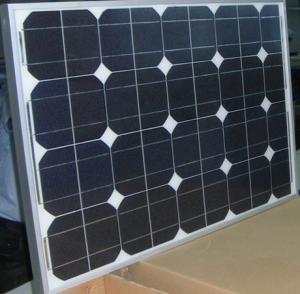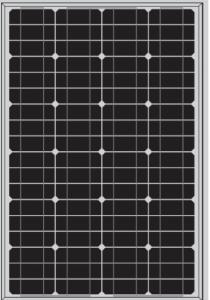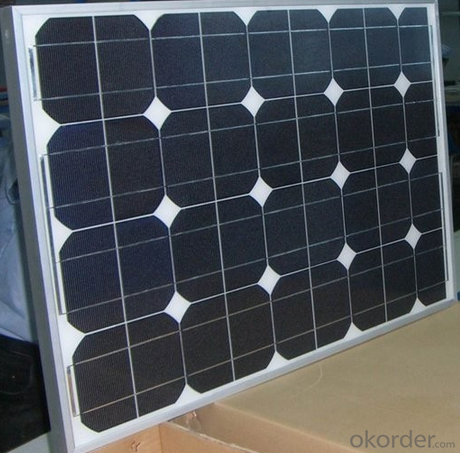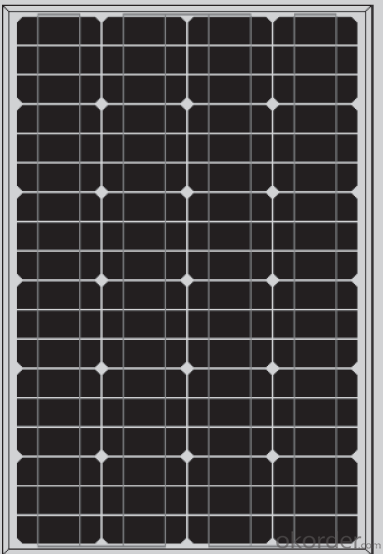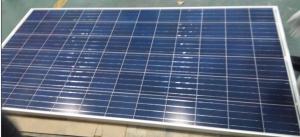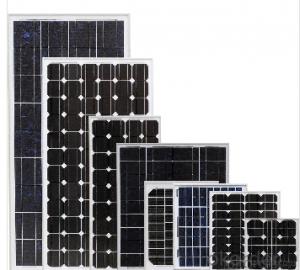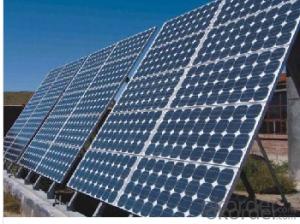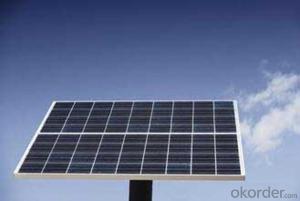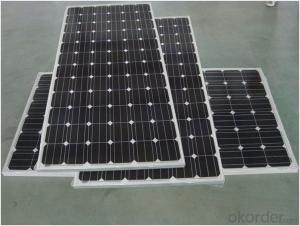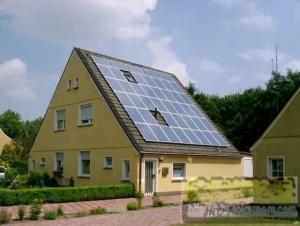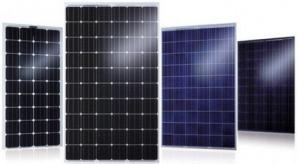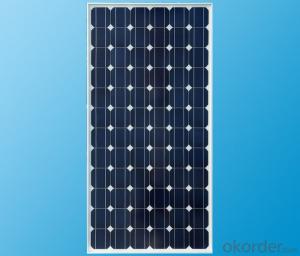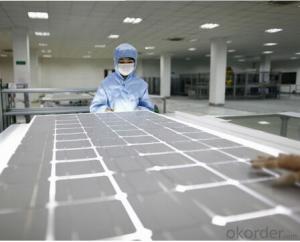Jayco Solar Panels - Mono Module 60W 65W Grade A Panels 25 Years Warranty
- Loading Port:
- Shanghai
- Payment Terms:
- TT or LC
- Min Order Qty:
- 1 watt
- Supply Capability:
- 100000000000 watt/month
OKorder Service Pledge
OKorder Financial Service
You Might Also Like
Description:
CNBM Solar is a world-leading and Vertical integrated manufacturer of high-performance with Silicon,
Wafer, Cells, Modules, which convert sunlight into electricity for residential, commercial, and utility-scale
power generation.
The capacity of CNBMSolar is reach to 1GW, and make sure each year our shipment capacity is more
Than 700-800MWs, at the same time, we have set up the largest solar power station with our partner
in Ukraine.
CNBM is a Quality + Service oriented company with“Excellence at Each Step” approach, composed of
the finest components from TUV and IEC-certified partners around the world, CNBM modules consistently
undergo a variety of trials at the company’s Test & Development Centre, ensuring peak performance
capabilities. The company is committed to develop and provide the world with clean and renewable energy
to ease the energy shortages as well as human kind’s impact on the environment.
Data:
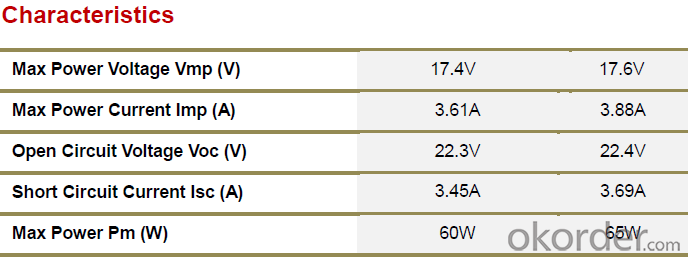
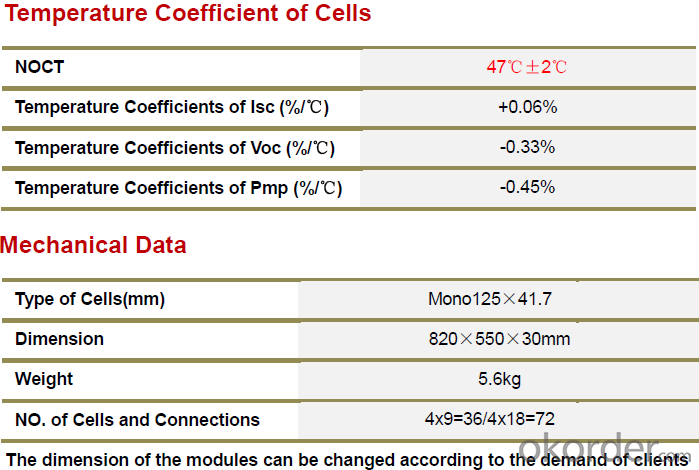
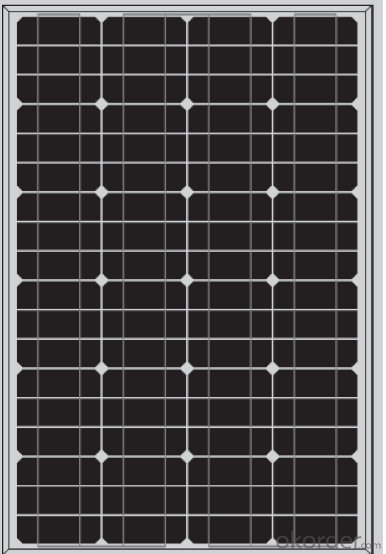
FAQ:What's your products' warranty ?
No less than 90% within 10yrs and no less
than 80% within 25yrs
- Q: I have two solar panels that were going to be trashed at work. I want to use them to charge batteries on my RV but i noticed they put out around 20 volts in direct sunlight. So i am wondering: -isn't this way too much voltage for a 2 volt system? -do a need some sort of a regulator connected to keep them from overcharging?
- 20 volts is a common open-circuit voltage for nominal 2v panels. The panels put out about 5v at full load. If the panel puts out little enough that it takes 20 hours or more to put a full charge in the battery you can get by without a charge controller - just keep the cells topped up with distilled water. A charge controller will do a more efficient job, though. The most efficient charge controllers use what's called Maximum Power Point Technology (MPPT) which lets the panels operate at their most efficient point throughout the battery's charging cycle. Available on OKorder. The charge controller should have the same or higher wattage as the panels it controls - if you're not sure of wattage, assume that they are the same as similar area panels you find for sale. Before buying a charge controller, connect the panels through an ammeter to a discharged battery. They may have been trashed because of damage and low output. You need at least an amp for trickle charge, 5 amps for reasonable recharge times.
- Q: Does the new horizons has a solar panel for it power resources instead using nuclear generator?
- It uses the nuclear decay of plutonium in a 'Radioisotope Thermoelectric Generator, or RTG. The heat of plutonium decay is captured and converted to electricity. Pioneers 0 and , Curiosity on Mars, and other deep-space probes use this, as the sun's light is too dim to use solar panels.
- Q: Can solar panels be used for charging electric bikes?
- Yes, solar panels can be used to charge electric bikes. By converting sunlight into electricity, solar panels can provide renewable energy to charge the batteries of electric bikes, making them a sustainable and eco-friendly option for transportation.
- Q: I want to use this solar panel to hook up AC adapters. IM not sure what to do and how to use the solar panel. I want to be able to use a batter charger, a radio, and charge a GPS if needed. - Thanks, Zoo
- You don't have much power to work with there. You could hook it up to a car battery to give it a sloooooow trickle charge. One amp will take like 60 hours of sunlight to completely charge a car battery. You'll be able to power small radios, ones that need nine to twelve volts or so. Just position the panel a bit away from the direct to the sun angle for your 9-volt radios, right at the sun for 2-volt radios. I would not try to power any AC adapters. You'd have to buy a DC to AC inverter, a very small one, and the inverter would steal about half the energy.
- Q: i know that a solar panel of square meter generate 000 watts on a clear and sunny day, but i need to know the time rate. is it 000 watts per day or per hour? Thanks.
- watts per hour or day is a meaningless concept. Watts are joules per second, where joules are a unit of energy. Watts are the RATE of energy being used or generated. .
- Q: Could you throw some long scientific words in with your answer so I can impress my teacher, I'm looking to expand my scientific vocab. Thanks
- Actually Photovoltaic cells also called solar cells in collection forms solar panel. Photovoltaic cells consist of silicon for converting solar energy into electrical energy.
- Q: Can we cover up solar panels on our house with regular siding?
- Strange question....most people now days are wanting to get solar panels and you are wanting to COVER them up. Are they not working? Have then removed before you put any siding in that area.
- Q: Can solar panels work during cloudy or rainy days?
- Yes, solar panels can still generate electricity during cloudy or rainy days, although their efficiency may be reduced. While direct sunlight is optimal for maximum power output, solar panels can still capture diffuse sunlight and convert it into usable energy.
- Q: Can solar panels be installed on a shaded roof?
- Yes, solar panels can be installed on a shaded roof, but their efficiency may be significantly reduced. The amount of shade and its duration throughout the day will determine the impact on energy production. It is recommended to assess the roof's shading factors and consult with a solar panel installer to determine the feasibility and potential output of a shaded installation.
- Q: Are there any risks of fire associated with solar panels?
- Yes, there are certain risks of fire associated with solar panels, although they are relatively low compared to other energy sources. Potential causes of fire include electrical malfunctions, improper installation or maintenance, and damage from external factors such as lightning or extreme weather conditions. However, modern solar panel systems are designed with safety measures in place to minimize these risks, including fire-resistant materials and enhanced electrical protection. Regular inspections and adherence to installation guidelines can further reduce the chances of fire incidents.
Send your message to us
Jayco Solar Panels - Mono Module 60W 65W Grade A Panels 25 Years Warranty
- Loading Port:
- Shanghai
- Payment Terms:
- TT or LC
- Min Order Qty:
- 1 watt
- Supply Capability:
- 100000000000 watt/month
OKorder Service Pledge
OKorder Financial Service
Similar products
Hot products
Hot Searches
Related keywords
